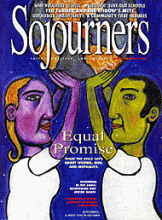"From now on, therefore, we regard no one from a human point of view....This is from God, who...has given us the ministry of reconciliation."— 2 Corinthians 5:16, 18
Maude lives in a modest home in a senior citizens' complex outside Cape Town, South Africa. Her story is tragically typical. Thirty years ago—when the apartheid government's Group Areas Act declared the best areas of South Africa "white"—police kicked in her door and stormed into her home in the middle of the night. Rifles pointed at their heads, Maude, her husband, and five children were forced out and thrown into a truck. The police drove them miles away to a barren spot of bush and dumped them there, with nothing. This cruel policy of "forced removals" was the start of the vast squatter camps that were patched together by people who had had everything they owned stolen from them.
I asked Maude the question that I asked virtually everyone I met as I traveled throughout South Africa [in the] summer of [1997]: "Why aren't you consumed with bitterness and hatred?" She answered, "I don't know if I have forgiven them. But I believe that if I want God to forgive me, I have to forgive them."
I wanted to take her by the shoulders and say something like, "I barely know you. But I can't imagine there's anything that you've done that even comes close to what has been done to you."
But many people in South Africa have chosen not to see it that way. They have come to understand and embrace that difficult passage in 2 Corinthians about seeing no longer from a human point of view, but with the eyes of Christ.
Read the Full Article
